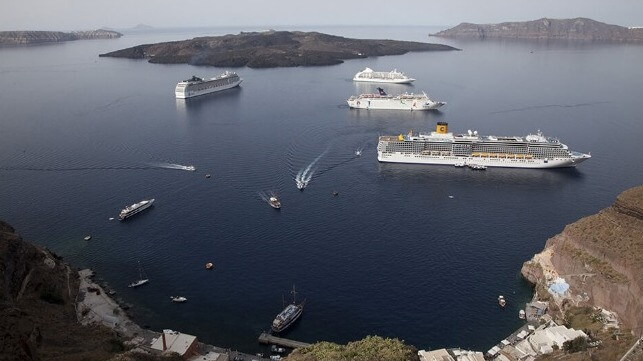Greece and Mexico Move Ahead with Cruise Passenger Taxes

Two of the most popular destinations for cruise ships both moved forward with their proposed tax increases on passengers due to be enforced starting in 2025. Cruise industry associations complained of a lack of consultation by the respective governments and called for efforts to work together to address concerns while protecting the tourism industry.
Greece’s Prime Minister proposed new taxes on cruise passengers and specifically at Mykonos and Santorini two of the most popular destinations in the Greek Islands. Both destinations complained of being overwhelmed by the number of daily cruise passengers during the peak season. Santorini reported approximately 1.3 million cruise passengers in 2023 while Mykonos had nearly 1.2 million with both destinations experiencing increases in 2024. Reports said that Santorini during the summer had approximately 17,000 tourists arrive in 24 hours and one day in August with over 11,000 cruise passengers.
According to reports in the Greek media, there were heated debates about the broader tax proposals in the Parliament on Wednesday, December 4, but the bills passed. During peak season, Greece will charge €20 per passenger at the two most popular islands and €5 at the smaller islands. In addition, they are increasing the tax on short-term rentals and hotel rooms with Reuters reporting the goal is to raise €400 million in new tax revenues. The government promised that a portion of the tax would be used to enhance port facilities and help local governments address the impact of tourism and climate change.
Mexico’s Senate moved quickly and on Wednesday, December 4, it also approved a tax that had cleared the lower house of Congress last week. The new tax is scheduled to go into effect on January 1, with a fee of $42 per passenger on cruises in addition to an existing $5 tax imposed in some Mexican states. Critics were quick to say that it would make Mexico one of the most expensive destinations in the Caribbean. Cruises had previously been exempted from the tourist taxes which only applied to hotel stays of a week or longer. The hotel tax is also being raised.
President Claudia Sheinbaum of Mexico defended the tax saying it was an increase based on inflation and rising costs.
“Joint efforts between the government and the cruise industry are essential to creating sustainable growth that benefits all parties,” said Michele Paige, CEO of the Florida-Caribbean Cruise Association speaking on behalf of the cruise industry. The organization complained of the short lead time saying passengers have already paid for winter 2025 cruises and that the move was taken without consulting the cruise industry. It noted that over 10 million cruise passengers are expected to visit Mexico in the current season.
“We are hopeful we can work together to find solutions that preserve Mexico’s vital role in the cruise market while ensuring economic stability for the communities that depend on it,” said Paige.
Sheinbaum said the government would be consulting with agencies impacted by the fees. She also reported that federal officials would be working with the cruise industry while saying the changes will happen slowly.
The taxes come as many destinations are grappling with the increasing number of cruise passengers and complaints of overtourism. The cruise industry highlights that it can adjust schedules and stagger the arrival times of ships into ports to help with the demands on port infrastructure. Destinations from Maine to Florida and Alaska have imposed daily limits on the number of arriving passengers or ships and their size. Some cities such as Amsterdam and Barcelona are looking to relocate cruise ships away from the city center while Venice was forced to move the cruise piers to a neighboring city as environmentalists and others protested the impact on the historic locations.
No comments:
Post a Comment